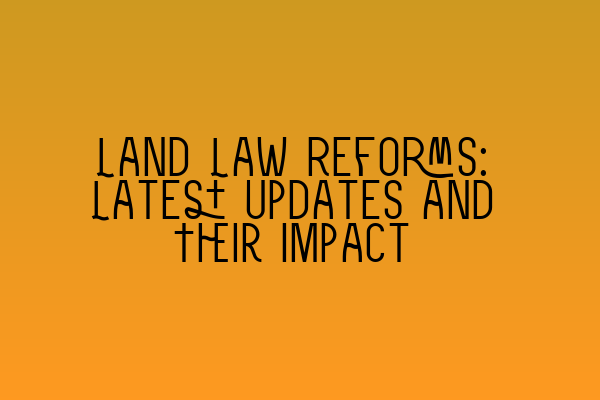Land Law Reforms: Latest Updates and Their Impact
Introduction
As a leading solicitor firm specializing in property law and land law, SQE Property Law & Land Law is committed to providing our clients and the public with the most up-to-date information on legal developments that may impact their land holdings. In this blog post, we will discuss the latest land law reforms and their potential implications. It is essential for property owners, investors, and professionals in the industry to stay informed about these changes to protect their interests and make informed decisions. So, let’s dive right into it!
Reform 1: Abolition of Feudal Tenure
The first major reform we will address is the abolition of feudal tenure. Feudal properties, especially in Scotland, have long been subject to a complex system of ownership and rights. However, with recent legislative changes, feudal tenure is no longer recognized. This reform has significant implications for property owners who previously held properties under feudal tenure. To understand the impact of this reform fully, visit our article on the SQE 1 Practice Exam Questions.
Reform 2: Leasehold Reforms
Leasehold reforms have been a hot topic in recent years, with increasing concerns over unfair practices and onerous terms faced by leasehold property owners. To address these issues, the government has introduced various reforms aimed at improving leasehold arrangements and protecting the rights of leaseholders. These reforms include stricter regulations on ground rents, extension of lease terms, and the ability to enfranchise leasehold properties. More details on these reforms can be found in our article on SQE 1 Practice Mocks FLK1 FLK2.
Reform 3: Changes to Planning Permission Regulations
Another crucial aspect of land law reforms is the changes to planning permission regulations. These reforms aim to streamline the planning process, encourage sustainable development, and provide more clarity on permitted development rights. Property owners and developers need to stay informed about these changes to ensure compliance and take advantage of new opportunities. To learn more about the specifics of these planning permission reforms, check out our article on SQE 2 Preparation Courses.
Reform 4: Land Registration Reforms
Land registration reforms have also been implemented to improve the efficiency and transparency of the land registration process. The reforms include the digitization of land records, simplification of registration procedures, and the introduction of electronic signatures. These changes streamline the conveyancing process and provide increased security for property owners. For a comprehensive understanding of the implications of land registration reforms, read our article on SQE 1 Preparation Courses.
Conclusion
Staying up-to-date with land law reforms is crucial for property owners, investors, and professionals in the industry. These reforms can have significant implications for landownership, leasehold arrangements, planning permissions, and land registration processes. By understanding the latest updates and their impact, stakeholders can make informed decisions, protect their interests, and ensure compliance with the law.
At SQE Property Law & Land Law, we are committed to providing expert advice and guidance on all land law matters. If you have any questions or require legal assistance, do not hesitate to contact us. Also, keep an eye on the SRA SQE Exam Dates to stay informed about the examination schedules for aspiring solicitors.
Note: This blog post serves as a general overview of land law reforms. It is not intended to be legal advice. For specific legal inquiries or concerns, please consult with a qualified solicitor.
